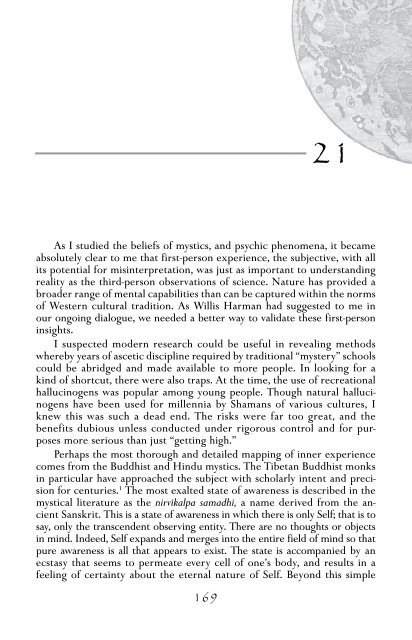edgar-mitchell
edgar-mitchell
edgar-mitchell
You also want an ePaper? Increase the reach of your titles
YUMPU automatically turns print PDFs into web optimized ePapers that Google loves.
Down and In 85<br />
volition had given me a wife and family, and had taken me into the Navy,<br />
and finally to outer space. Human volition can also bring about the difficulties<br />
we deal with in life. In late 1971, it brought about separation from<br />
Louise and eventual divorce, as this new interest of mine moved toward an<br />
obsession. It brought the agony that accompanies the separation of loved<br />
ones when such difficult choices are made. The shape of an individual life<br />
seems drawn with a capricious pen as the consequences of our choices can<br />
never be fully known.<br />
In the same unpredictable manner, the collective human volition would<br />
likely take humankind throughout the cosmos one day, unless we destroy<br />
ourselves first as a result of being unable to evolve beyond war-mongering.<br />
But to demonstrate, even to myself, that volition is real and not just a<br />
grand illusion, as scientific determinism decrees, this doctrine known as<br />
epiphenomenalism needed to be falsified. Here lay the crucial key to my<br />
bewilderment. It was this cornerstone of scientific thinking that distorted<br />
my own perception. As innocuous as the concept of epiphenomalism may<br />
seem on the surface, it suggests the Newtonian idea that the fate of the<br />
universe is predetermined only by the laws of classical physics, and therefore<br />
entirely predictable. It allows no room for human intentionality. What<br />
this implies is that we humans are not really in control of our lives, but<br />
merely complying with the predetermined course of our fate as dictated<br />
by the immutable laws of physics. Surely, there must be an answer between<br />
a nihilist’s materialism on the one hand, and paternalistic, supernatural<br />
deism on the other.<br />
In the months following our return from the moon I began reading the<br />
mystical literature of both Eastern and Western religions. But I was careful<br />
in choosing my material, preferring esoteric literature, not exoteric<br />
(institutional) viewpoints. It was the “religious” experience, or epiphany,<br />
that occurs outside the influence of the Church and its dogma I was most<br />
interested in. Then one day an idea came to mind, one that would continue<br />
to grow for decades to come. From meager funds I commissioned a<br />
study by a qualified research team to dig up some facts on esoteric practices<br />
in various world cultures, and they came across some interesting discoveries<br />
that seemed to describe the essence of this epiphany. What the<br />
ancients, who wrote in the Sanskrit of India, described as a classic savikalpa<br />
sainadhi was essentially what I believe I experienced. In Eastern thinking,<br />
this phenomenon is a moment in which an individual still recognizes the<br />
separateness of all things, yet understands that the separateness is but an<br />
illusion. An essential unity is the benchmark reality, which is what the<br />
individual suddenly comes to experience and to comprehend.<br />
I recalled so vividly the separateness of the stars and planetary bodies<br />
on the way home from the moon, but simultaneously knew I was an intimate<br />
part of the same process. This is the most salient recollection of the


